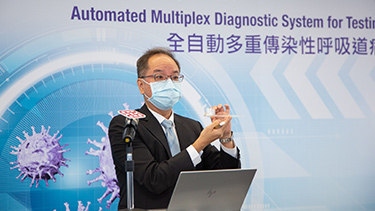COVID-19 - Automated Multiplex Diagnostic System

Sponsored by

COVID-19 - Automated Multiplex Diagnostic System
PolyU develops the world’s most comprehensive rapid, automated multiplex diagnostic system for detecting up to 40 infectious respiratory pathogens (including novel coronavirus) in a single test

Prof. Terence Lau, Director of PolyU Innovation and Technology Development, and his research team develop the world’s most comprehensive automated multiplex diagnostic system for detecting up to 40 infectious respiratory pathogens.

(3rd from left) Prof. Terence Lau, Director of ITDO, Prof. Alexander Wai, VPRD, Deputy President and Provost designate of PolyU, Prof. Wong Wing-tak, Dean of FAST, and Dr Manson Fok, Avalon Biomedical Management Ltd, attended the Press Conference

The PolyU-developed automated multiplex diagnostic system includes a fully automated machine and a multiplex full-screening panel. It is simple and easy to operate, with manual handling not being required throughout the testing process.

The PolyU-developed automated multiplex diagnostic system includes a fully automated machine and a multiplex full-screening panel. It is simple and easy to operate, with manual handling not being required throughout the testing process.
Infectious diseases represent an important portion of global public health concerns¸ in particular with regard to the current global outbreak of novel coronavirus (2019-nCoV). The challenge of frontline diagnosis in hospitals, clinics and ports is that infectious diseases could exhibit similar symptoms or can be asymptomatic. The Hong Kong Polytechnic University (PolyU) today announced the development of the world's most comprehensive automated multiplex diagnostic system (the System) which includes a fully automated machine and a multiplex full-screening panel for the point-of-care genetic testing (POCT) of respiratory infectious disease including the 2019-nCoV.
In one single test and within approximately one hour, the System can identify 30 to 40 pathogens including seasonal influenza viruses, such as influenza A subtypes H1, H2 and H3, avian influenza viruses H5, H7 and H9, human respiratory syncytial virus, severe acute respiratory syndrome coronavirus (SARS-CoV), Middle East respiratory syndrome coronavirus (MERS-CoV) and 2019-nCoV. Leveraging the current polymerase chain reaction (PCR) technology, the system is fully automated from sample nucleic acid extraction and amplification, to signal detection and analysis. The System adopts patent-pending microfluidic and biochemical technologies that achieve ultra-sensitive detection (down to 5 gene copies) and simultaneous differentiation of various pathogens with extremely high specificity. It is also user-friendly, with manual handling not being required throughout the testing process.
"Early and accurate detection of pathogens could contribute to effective and efficient disease control and management, and prevent spreading of any contagious pathogens. It benefits the patients as well because timely therapy can then be applied to prevent complications. The existing challenge is that we lack full panel POCT technologies for early and on-site diagnosis, which should ideally be capable of differentiating between different pathogens at the same time. This newly-developed system could be a practical solution," said Professor Lau.
PolyU and The University of Hong Kong (HKU) have established the Respiratory Virus Research Foundation ("the Foundation") in 2015 and have since then been working on various innovative technologies to tackle existing and emerging respiratory infectious diseases. The Foundation has fostered various collaborations, including those on vaccine and rapid diagnostics respectively. The former is led by HKU Professor Yuen Kwok-yung, Henry Fok Professor in Infectious Diseases, Chair Professor of Infectious Diseases from the Department of Microbiology, Li Ka Shing Faculty of Medicine; the latter is led by PolyU Professor Terence Lau Lok-ting, Director of Innovation and Technology Development and Adjunct Professor at the Department of Applied Biology and Chemical Technology.
Ir. Professor Alexander Wai Ping-kong, Vice President (Research Development), Deputy President and Provost designate of PolyU said, "In this difficult and challenging time that Hong Kong, the Chinese mainland, and even the global community is encountering, it is important that the research community can quickly pool their expertise and resources to develop practical solutions. The PolyU-HKU partnership is a prime example of effective coupling of multidisciplinary innovation and translation."
The research team for this project is led by PolyU Professor Terence Lau Lok-ting and supported by HKU Professor Yuen Kwok-yung. Through collaborative efforts, the team has spent the past four years to develop the System. In the past year, the team has optimised the System and conducted trials on different clinical samples. In the midst of the 2019-nCoV outbreak, the team has also conducted tests on clinical samples using the system.
Professor Yuen commented, "The System's versatility and capability will provide for comprehensive monitoring during disease outbreaks or routine surveillance. It will become a crucial technology for ensuring the effective control of infectious diseases, medical diagnosis, and treatment."
"This fully automated, quantitative rapid diagnostic platform possesses a proprietary technology which overcomes limitations of existing technologies by ensuring sensitivity – and hence significantly enhancing the reliability of test results. Most importantly, our innovation can substantially reduce the cost of the microfluidic cartridge manufacturing thus making it feasible for wide adoption. It is ready for mass-scale production," added Professor Lau.
The research team has received indispensable support from a local biotechnology company Avalon Biomedical Management Ltd for this project. "We are honoured to be able to participate in this project and are delighted to see this important milestone in the collaboration between Professor Lau and Professor Yuen. We believe this advanced point-of-care diagnostic system can revolutionize the current diagnostic paradigm and provide a powerful tool to fight against infectious diseases," said Dr Manson Fok, Chairman of the Board of the company, Executive & Trust Committee member of Macau Henry Fok Foundation and Dean of Faculty of Medicine, Macau University of Science and Technology.
Humankind's modern day battles against epidemics remain a major challenge and it is vital that we keep learning from the past and equipping ourselves with the best technologies available. Towards this end the research team will continue to urgently focus on developments to ensure the system's robustness and cost-effectiveness, and to collaborate with relevant parties on clinical trials, regulatory approvals, and frontline applications of this POCT system.
Video sharing by HKU Professor Yuen Kwok-yung, Henry Fok Professor in Infectious Diseases, Chair Professor of Infectious Diseases from the Department of Microbiology, Li Ka Shing Faculty of Medicine: